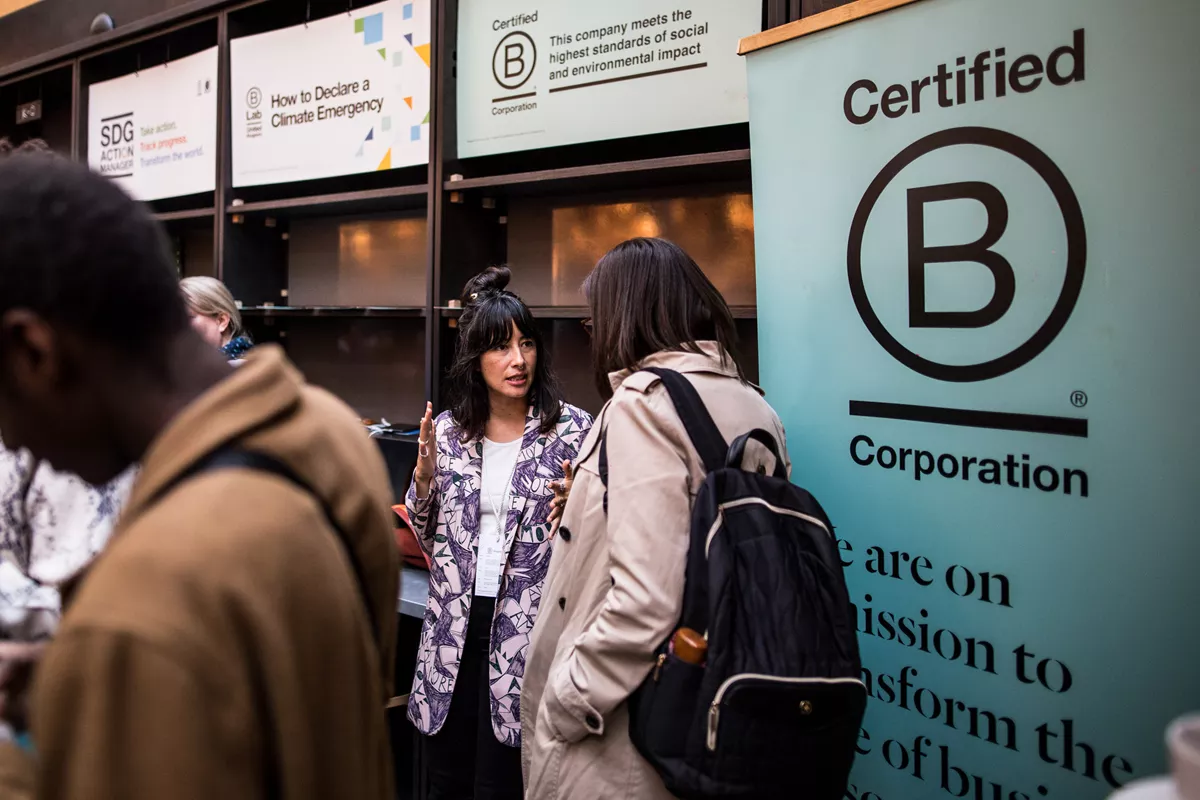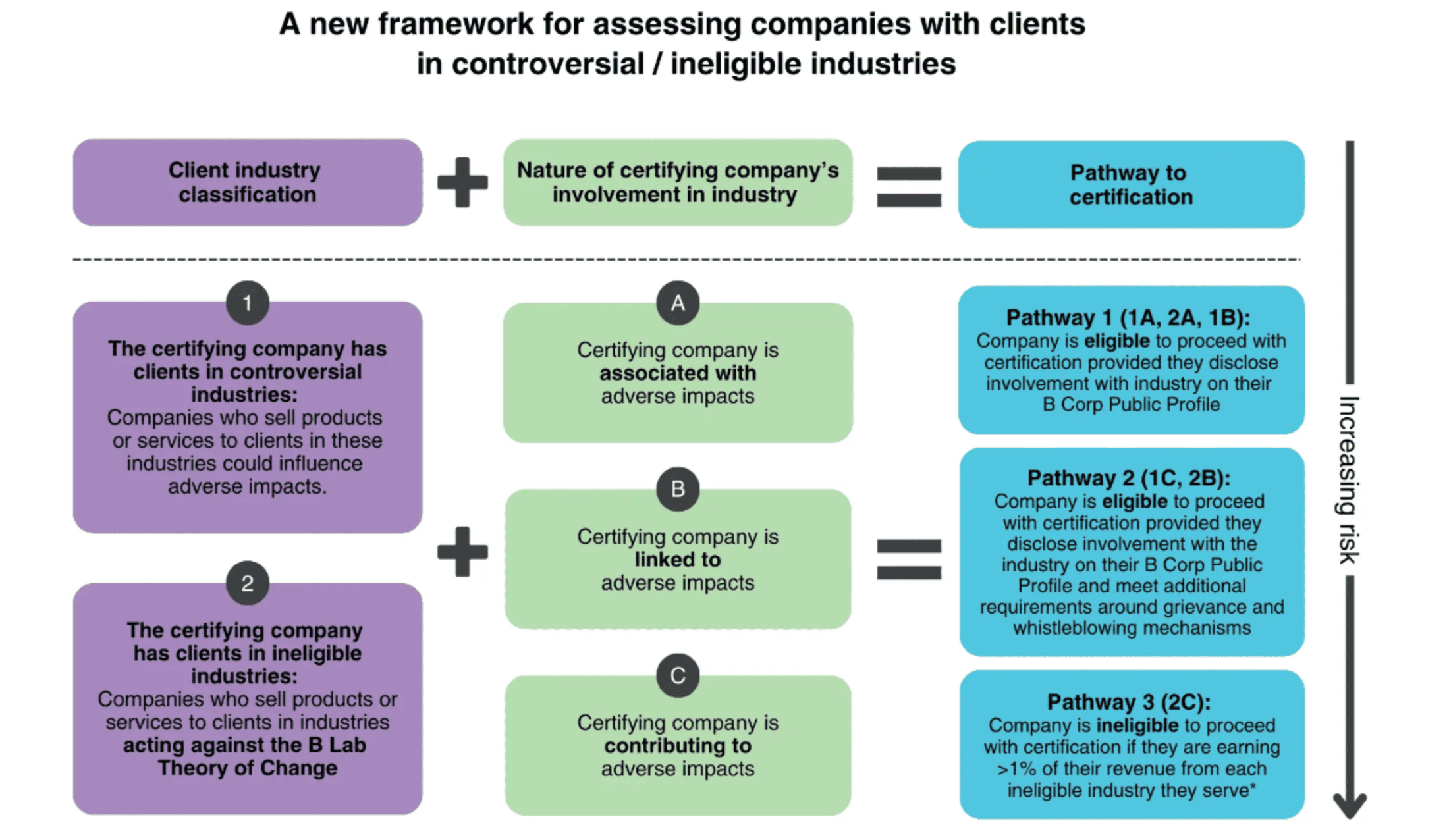
The growth of the B Corp movement brings with it an evolving understanding of what it means to be a certified B Corp. As B Lab refines the standards for certification, the pathways to achieving this status are also adapting, including what it means to be eligible.
As of November 2024, B Lab has updated its eligibility requirements for companies working with clients in controversial or ineligible industries, taking a more nuanced and inclusive approach. This means many companies previously ineligible can now pursue certification. This change reflects B Lab’s commitment to refining the B Corp certification process and ensuring it remains rigorous yet inclusive.
In this blog post, we’ll break down these new eligibility requirements, explore the different pathways to certification, and provide guidance on how your business can navigate this evolving landscape.
Understanding the shift
Previously, many companies were paused in their B Corp certification journey due to deriving revenue from industries deemed controversial or ineligible by B Lab. This created a barrier for businesses that, despite their own sustainable and ethical practices, were limited by the nature of their clients’ operations.
The new guidance provides clarity and opens pathways to certification for these companies. It takes a risk-based approach, considering the nature of the company’s involvement with controversial clients and the potential for negative impact.
B Lab’s definitions: controversial vs. ineligible industries
Before we delve into the updated eligibility requirements, it’s important to understand B Lab’s definitions of “controversial” and “ineligible” industries. These terms are specific to B Lab’s assessment criteria and reflect their commitment to ensuring that certified B Corps uphold the highest standards of social and environmental performance.
Controversial industries
B Lab defines “controversial” industries as those where companies selling products or services to clients could potentially influence adverse impacts. These industries include:
- Charity Lotteries
- Debt Collection agencies in emerging markets
- Nuclear Power or Radioactive Materials
- Mining
- Pharmaceuticals
- Recreational Marijuana
Ineligible Industries
“Ineligible” industries are those that B Lab considers to be fundamentally incompatible with their Theory of Change. These industries include:
- Fossil fuel producers
- Gambling
- Pornography
- Prisons and detention centers (including labor)
- Tobacco (including all nicotine products)
- Weapons and Defense
It’s important to note that these definitions are created and governed by B Lab and may evolve over time as the B Corp movement continues to develop and refine its standards.
Three pathways to certification
B Lab has outlined three distinct pathways to certification, each tailored to a different level of risk. The pathways are based on whether your clients operate in controversial or ineligible industries, and the nature of your company’s involvement with those industries based on:
- Your organisation is associated with adverse impacts: providing a basic or generic service/product to clients with adverse impacts, and the service/products are available to all individuals. For example, your organisation sells paper cups. The product remains the same regardless of the industry or the environmental impact of the purchasing organisation.
- Your organisation is linked to adverse impacts: not directly causing or contributing to harm, but is connected to it through its business relationships (suppliers, consumers, etc.) For example, your organisation is an accountancy and is tailoring its work to the client. Whilst it’s helping that organisation, it is not directly causing or contributing to the harm the client may be creating.
- Your organisation is contributing to adverse impacts: when your organisation’s actions or omissions, combined with those of other parties, facilitate or increase negative human rights or environmental impacts. For example, a marketing agency who helps a tobacco company to sell more cigarettes.
B Lab recommends 3 pathways based on these factors (see diagram below):
- Your company is eligible to proceed with certification, provided you disclose your involvement with the controversial industry on your B Corp Public Profile. See an example of a transparent disclosure on The Guardian Media Group profile.
- Your company is eligible to proceed with certification, provided you disclose your involvement with the controversial industry on your public profile, and meet additional requirements around grievance and whistleblowing mechanisms.
- Your company is eligible to proceed with certification, provided you do not exceed 1% of revenue from each ineligible industry you serve, in addition to meeting the transparent disclosures and grievance and whistleblowing mechanisms guidelines.
The following diagram from B Lab exemplifies the route to each of these pathways:

*Important Note: Companies earning more than 1% of their revenue from controversial industries have until February 18th 2025 to submit their B Impact Assessment and commit to reducing that revenue below the threshold by the time they recertify. Learn more from B Lab here.
What this means for your business
- If you had submitted for certification, and B Lab paused your evaluation due to eligibility issues, B Lab will be in touch soon to inform you of next steps.
- If you decided to put your certification journey on hold due to eligibility issues, you can now reassess your eligibility and potentially move forward with certification.
We understand that eligibility is one of the many factors to consider when it comes to deciding if B Corp is right for your business. We’re here to help – get in touch with us if you have any queries, or if you’re seeking support to guide you through the certification process.


